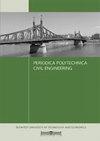早期龄期对混凝土重力坝力学性能影响的数值模拟
IF 1.4
4区 工程技术
Q3 ENGINEERING, CIVIL
引用次数: 0
摘要
早期龄期效应引起的热裂缝的控制是混凝土坝施工阶段关注的主要问题。尽管其重要性,但在文献中对混凝土重力坝在施工期间的详细热分析相对较少,最终因为预测混凝土重力坝的早期行为需要考虑多种现象和相互作用,需要大量的计算工作。为了克服这一缺点,本文提出了一种考虑龄期和施工进度影响的混凝土重力坝在施工期间热力学行为预测的数值模拟策略。并应用该策略研究了预冷方式对混凝土重力坝施工过程中热-力学场的影响。为此,建立了一种化学-热-力学模型,用于预测重力坝在早期阶段的行为。首先,建立温度场模型,并与文献结果进行验证。此外,还研究了混凝土重力坝在预冷早期龄期和未预冷早期龄期两种状态下的热力学行为。热应力分析结果表明,由于混凝土的内部约束,施工后最大的拉应力发生在坝后跟和混凝土界面恢复处。数值结果表明,预冷方法是降低水化温度和早期龄期影响引起的拉应力的有效方法。本文章由计算机程序翻译,如有差异,请以英文原文为准。
Numerical Modeling of Early-age Effects on the Mechanical Behavior of Concrete Gravity Dams
The control of thermal cracks induced by the effect of early age are the main concerns in concrete dam during the construction stage. Despite its importance, detailed thermal analysis of concrete gravity dams during the construction period is relatively rarely in the literature, eventually because prediction the behavior of concrete gravity dam on early stage requires taking into account the several phenomena and interaction, demands a considerable computational effort. To overcome this drawback, the present paper proposes a numerical modeling strategy to predict the thermo-mechanical behavior of concrete gravity dams during construction periods considering the effect of early age and the construction schedule. The proposed strategy is also used to study the effect of pre-cooling methods on the thermal-mechanical fields on concrete gravity dam during construction process. For this purpose, a Chemo-Thermo-Mechanical model is developed for predicting the behavior of a gravity dam at early stages. Firstly, temperature field model was established and verified with the results reported in the literature. Furthermore, the thermo-mechanical behavior of a concrete gravity dam is performed for two configurations: Early age state with pre-cooling and early age without pre-cooling. Thermal stress analysis was also conducted and results showed that the greatest tensile stresses after construction are developed at the heel of dams and resumption of concreting interface due to the internal restraint imposed by the concrete. The numerical results showed that the pre-cooling methods is an effective way to reduce both the hydration temperature and tensile stress induced by the effect of early age.
求助全文
通过发布文献求助,成功后即可免费获取论文全文。
去求助
来源期刊

Periodica Polytechnica-Civil Engineering
工程技术-工程:土木
CiteScore
3.40
自引率
16.70%
发文量
89
审稿时长
12 months
期刊介绍:
Periodica Polytechnica Civil Engineering is a peer reviewed scientific journal published by the Faculty of Civil Engineering of the Budapest University of Technology and Economics. It was founded in 1957. Publication frequency: quarterly.
Periodica Polytechnica Civil Engineering publishes both research and application oriented papers, in the area of civil engineering.
The main scope of the journal is to publish original research articles in the wide field of civil engineering, including geodesy and surveying, construction materials and engineering geology, photogrammetry and geoinformatics, geotechnics, structural engineering, architectural engineering, structural mechanics, highway and railway engineering, hydraulic and water resources engineering, sanitary and environmental engineering, engineering optimisation and history of civil engineering. The journal is abstracted by several international databases, see the main page.
 求助内容:
求助内容: 应助结果提醒方式:
应助结果提醒方式:


